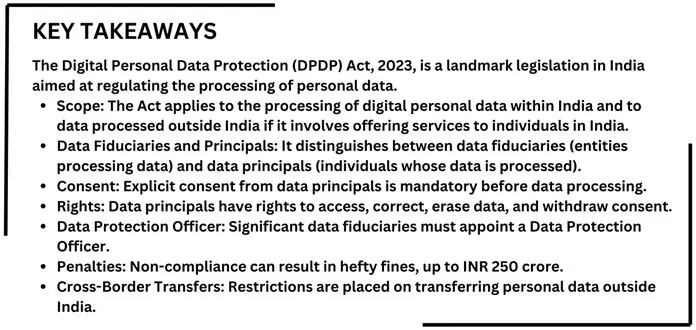
It was in August, 2023 that Indian government formally implemented the Digital Personal Data Protection (DPDP) Act. This legislation defines stages of India’s Digital Age purse the objective of protecting the rights of the person on processing of their personal data while not hindering the legal processing of data.
Historical concept and evolution
The process of achieving the DPDP Act started with the Supreme Court verdict in 2017 in the case of Justice K.S. Puttaswamy vs. Union of India, which played a ground for the constitutional right of privacy in the Indian constitution. This judgment laid down the context for a deeper data protection law reform. The first version of the Personal Data Protection Bill was brought in 2018 and many changes as well as debates were made afterward. These efforts have been enshrined in the radical DPDP Act of 2023 conforming to the emerging digital reality and the need for good Data Protection Policies.
Main Provisions of the DPDP Act
The DPDP Act supplements essential measures designed to safeguard personal data combined with an appropriate approach to legal processing activities. Some of the key features include:
- Data Fiduciaries and Data Principals: A data fiduciary means the person or the company that processes data while data principals are the individuals whose data is being processed. Such a division is relevant for determining obligations and privileges.
- Consent and Notice: The Act expects that data fiduciaries seek express permission from data principals for processing of their data. Data principals must possess a comprehensive awareness of the objectives of data processing, the nature of the data processing, and the duration of the data processing.
- Data Protection Officer (DPO): According to the Act, large data fiduciaries are required to appoint a Data Protection Officer. The latter will also serve as the contact between data principals and regulatory authorities to be referred to as the DPO.
- Rights of Data Principals: The Act provides the following rights to data principals: right of access, right of rectification or erasure. Data principals are also allowed to the right of data convenience and the right to the withdrawal of authority.
- Data Breach Notification: Disparities of data, a data fiduciary must provide notice to the Data Protection Board as well as to the data principals within a stipulated period of time. The transparency and accountability will increase by doing this.
- Cross-Border Data Transfers: The Act also provides limitations to the movement of personal data to any country which is not located in India. The conveyance of such transfers is permissible only where certain requirements are compiled to safeguard data privacy.
- Penalties and Compensation: The DPDP Act has also provided for severe punishment in case of violation, which varies from a few lakhs, cores of rupees. Data principals also hold rights to a remedy for any loss or harm resulting from data breaches or infringements of their rights.

Implications for Businesses
Due to these new regulations, corporates have no option but to incorporate a good data protection policy. This involves; the organization should also implement data protection policies and procedures perform data audit regularly, and employees should also be orientation with data protection principles.Future data transfers across borders becomes another focal issue of the Act since it restricts data transfers with solutions that ensure adequate protection from access by foreign governments. Companies using any service that transfers data overseas have to ensure that such data is protected and compliant with the standard contractual clauses or with other measures approved by the Indian government.
Future Outlook
The act’s operationalization presents a number of difficulties. Some challenges may arise to companies especially those that are in the small and medium enterprises since the Act is quite rigid in its requirements. Technological infrastructure, skilled personnel and financially resources for implementing the measures might be challenging for some of the organizations. Further, the effectiveness of the Act will therefore still also lie in the various enforcement measures and finally the capacities of the Data Protection Board to entertain and investigate complaints. It shall also be a critical success factor for the DPDP Act to ensure that the Board is well staffed and resources for the task ahead.
Considering its future developments, the DPDP Act is to be adopted as a constantly changing legal act corresponding to new challenges and opportunities of the digital environment. It continues the process of legislation to further future adjustments and adaptations, guaranteeing that India possesses the strong ground to data protection requirements. In the future as technology changes, the changes in data protection law will need to be monitored and updated regularly.
Challenges and Way Forward for the Digital Personal Data Protection Act
The DPDP Act, 2023 is a revolutionary legislation enacted in India to protect data of Individual in digital world. Nevertheless, the use of the guidelines evokes certain concerns. The following section presents the main issues related to the DPDP Act and proposes recommendations on how they should be solved effectively protect data.
Challenges
- Compliance Burden on Small and Medium Enterprises (SMEs): That is why the requirements set forth in the DPDP Act can be considered strict and difficult for SMEs to meet. Most of such companies are incapacitated in terms of funds and technical expertise to establish strict measures like hiring DPOs and Data protection assessments.
- Enforcement and Regulatory Capacity: It is a known fact that the DPDP Act can only be as good as the Data Protection Board of India implementing it. It is important that there is adequate staffing and provision of resources to the Board … thirdly; it will allow the government significant discretions, which will reduce the autonomy of the Board, and compromise its performance of the regulatory function.
- Cross-Border Data Transfers: The Act also contains provision regulating outbound transfer of personal data, which might be problematic for global organizations. It is obvious that the arrangements to ensure that the data transferred to other Countries meets the required protection standards are very cumbersome and costly.
- Awareness and Education: One drawback is the relative ignorance about the principles of data protection among the population and companies. Thus, without necessary education and training, people often do not fully utilizable their rights, and companies and other organizations can violate the law by accident.
- Technological Infrastructure: Cannot be overemphasized that the framework proffered for by the DPDP Act must be undergirded with elaborate technological hard ware in order to contain and secure data. Most organisation especially in rural areas we find that they will not have the internal capacity to enable them to meet the requirements of the policy.
Way Forward
- Support for SMEs: The government needs to give assistance to the SMEs in order for them to navigate through the compliance of the DPDP Act. On the strategic-cooperative level, this could comprise financial incentives, subsidies for technology modernisation, and the use of DPOs under contractual terms on a shared basis. The relative ease for little infringements could also be reduced as another compliance measure for small business.
- Strengthening the Data Protection Board: Especially the independence and capacity of the Data Protection Board must be ensured. This can be done by offering proper funding, recruiting qualified human resource, and setting out standard policies to reduce political influence. The credibility of the Board will also be strengthened by more frequent audits and more openness about the Board’s work.
- Facilitating Cross-Border Data Transfers: The government should try to build policies and foreign relations that will allow free cross-border data transfer along with the protection of citizens’ data. It could entail things such as incorporating the standard contractual clauses, engaging in international data protection bodies.
- Public Awareness Campaigns: Starting extensive publicity programs focusing on raising people’s and companies’ awareness about provisions of the DPDP Act is necessary. This might encompass holding of sessions such as workshops, having online materials as well as involving organizations that deal with industries in spreading information comprehensively.
- Infrastructure Development: The DPDP Act needs systematic technological investments; it is essential to incorporate new technology plans, especially in the calibrated and poor physical contexts. The government could possibly collaborate with the various private sector companies in order to provide the required infrastructure that will enable all areas adhere to the law.
The Act has been proposed to bring better improvements to the data privacy in India. Nevertheless, understanding how to overcome the problems that are related to its application is paramount for success. With this, India should ensure SMEs are supported as well as improving the Data Protection Board and mechanisms for cross-border data transfer, increasing public awareness and giving sufficient investment to technological structure to build a sound data protection regime which protects personal data and at the same time encourages innovation and growth.
Rights and Duties of Data Principal under the Digital Personal Data Protection Act
Rights of Data Principals
- Right to Information: The first data subject rights include a right to obtain data principals information on processing of their personal data and purposes of such processing, as well as the time limits for such processing.
- Right to Access: They may ask data fiduciaries for their personal data held in accordance with the Regulation.
- Right to Correction and Erasure: Data Principals can demand rectification of inaccurate data and can request that data which is no longer relevant for the purpose it was collected is deleted.
- Right to Data Portability: They may also request the transfer of their data to another data fiduciary in a comprehensible format that is commonly utilized.
- Right to Withdraw Consent: Data Principals also have the right to withdraw consent at any one time for the processing of their data.
- Right to Grievance Redressal: They can lodge complaint with the Data Protection Board if their rights so provided are infringed.
Duties of Data Principals
- Providing Accurate Information: It is crucial for the Data Principals to make sure that the data provided is correct and actualized.
- Compliance with Lawful Requests: They should also follow legal demands made by data fiduciaries for information that is relevant.
- Responsible Use of Rights: Data Principals should uphold their rights to an optimum without subjecting data fiduciaries to undue harm or inconveniencies.
Conclusion
The Digital Personal Data Protection Act, 2023 is one of the measures that define India’s progress toward personal data protection and the right to privacy. Balance on the user side is created by providing more control over personal data, more transparency and clear rules of data processing stipulated by the Act. The DPDP Act is a significant starting point for constructing the principles in light of present and future hurdles and for guaranteeing adequate knowledge for people as well as businesses dependent on information sharing within the cyber unity.